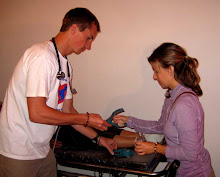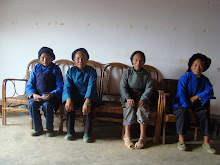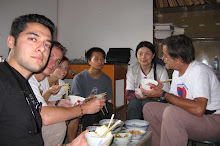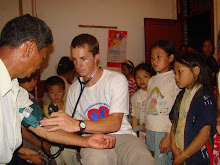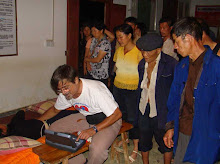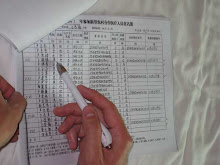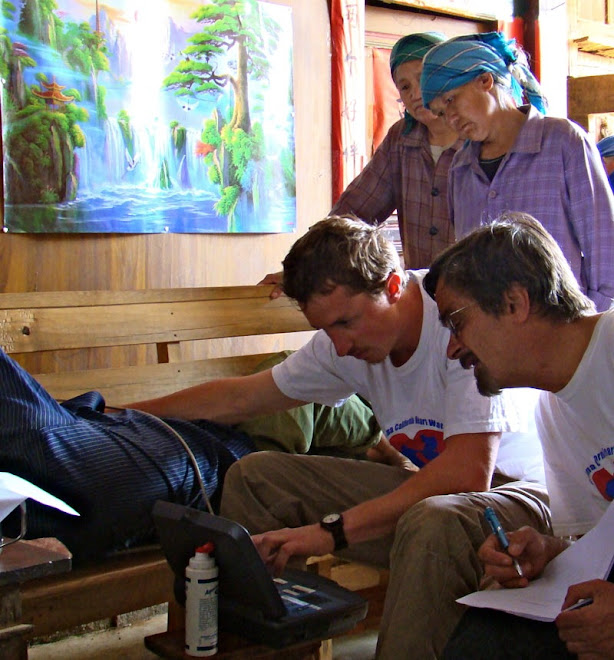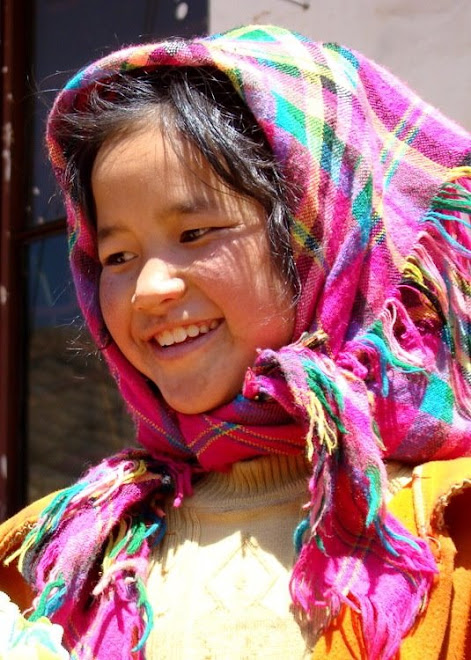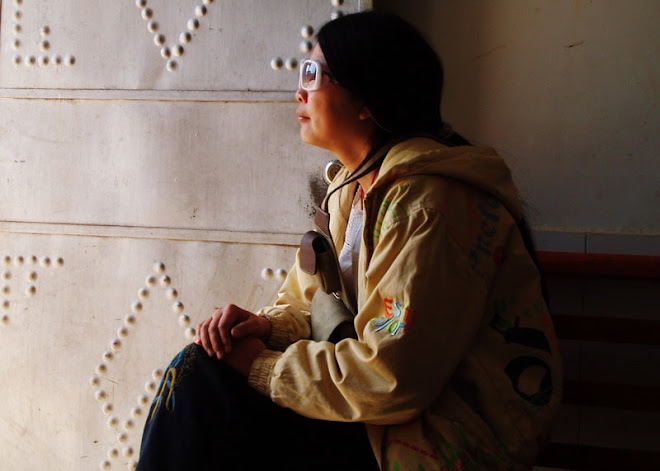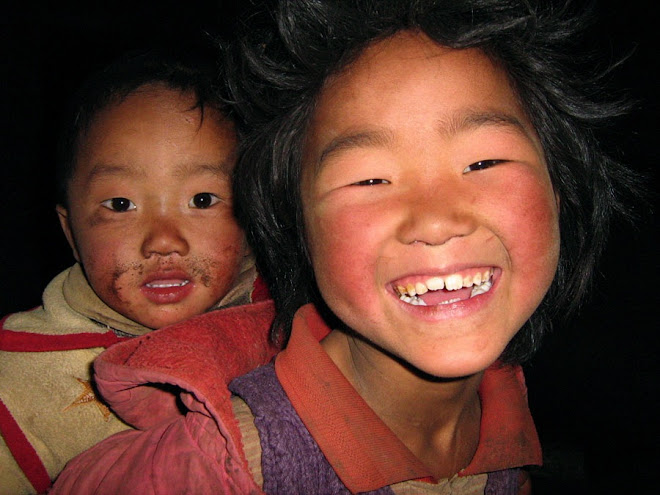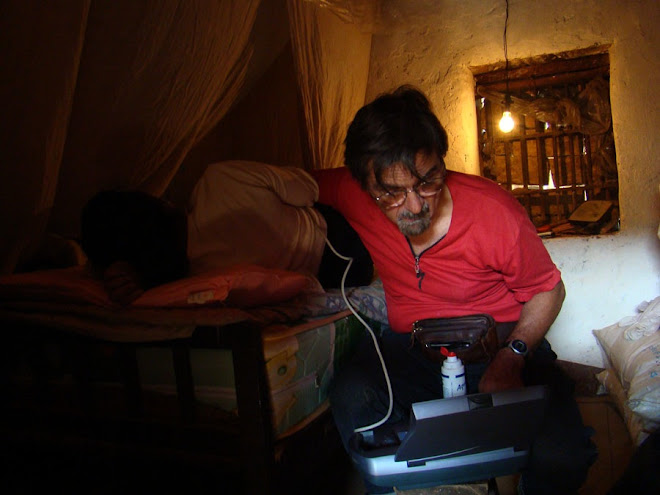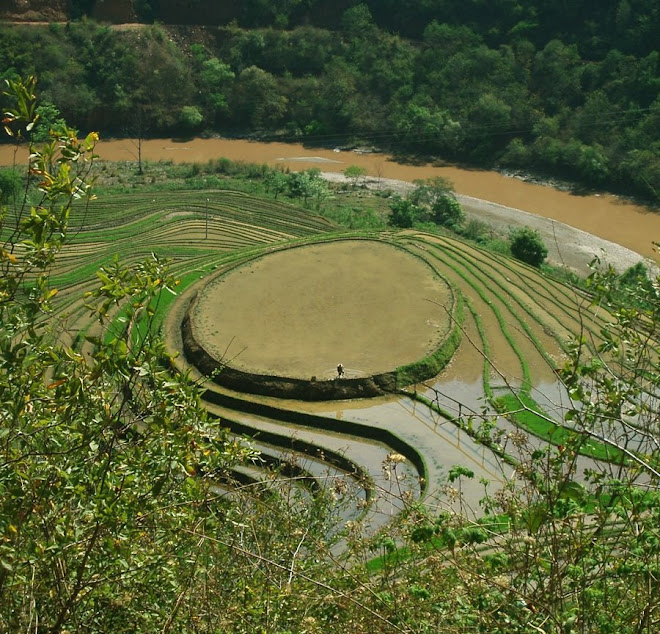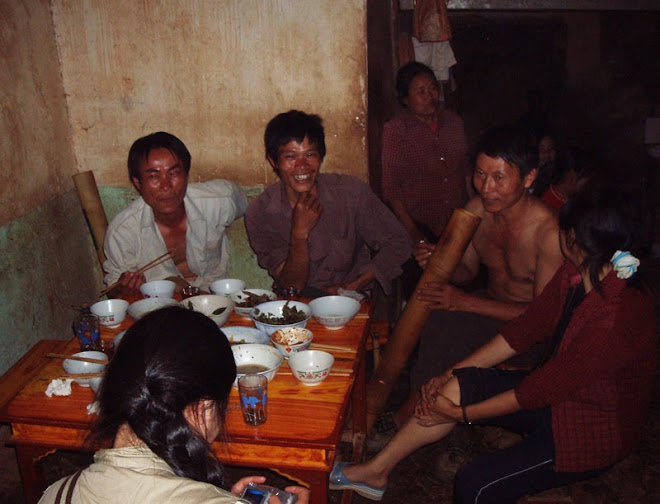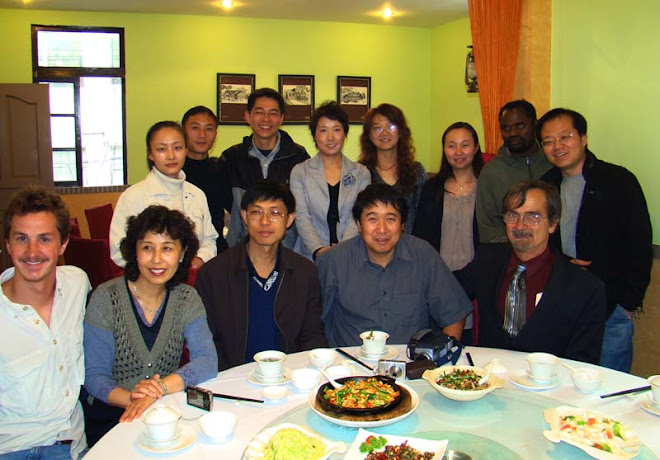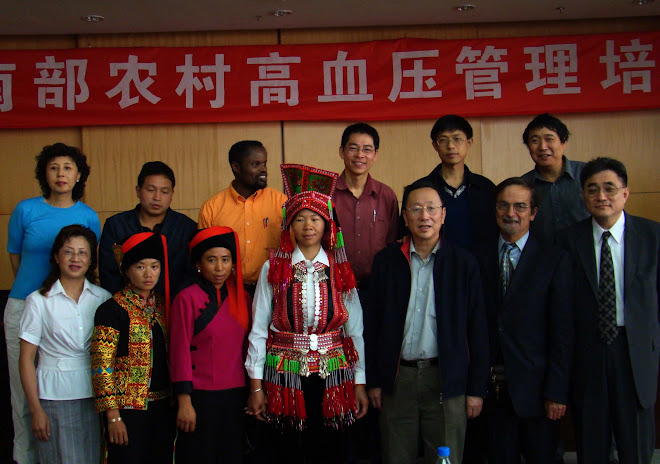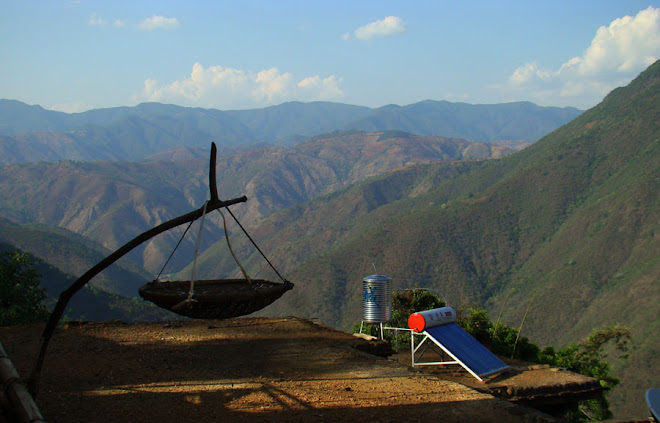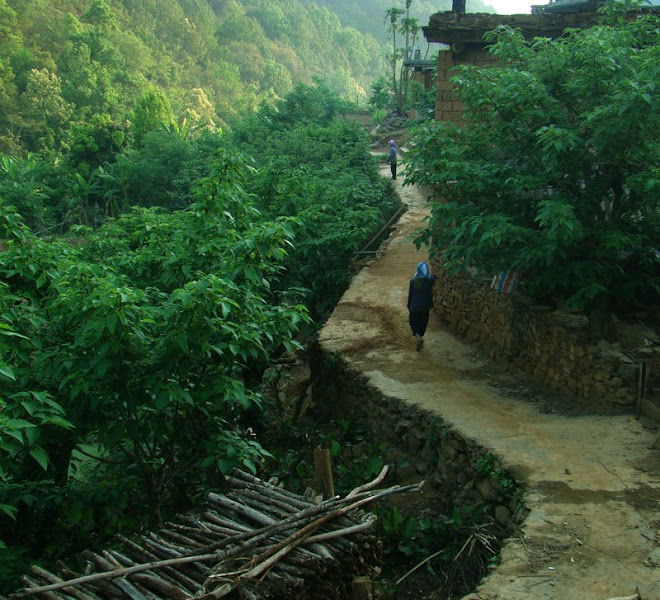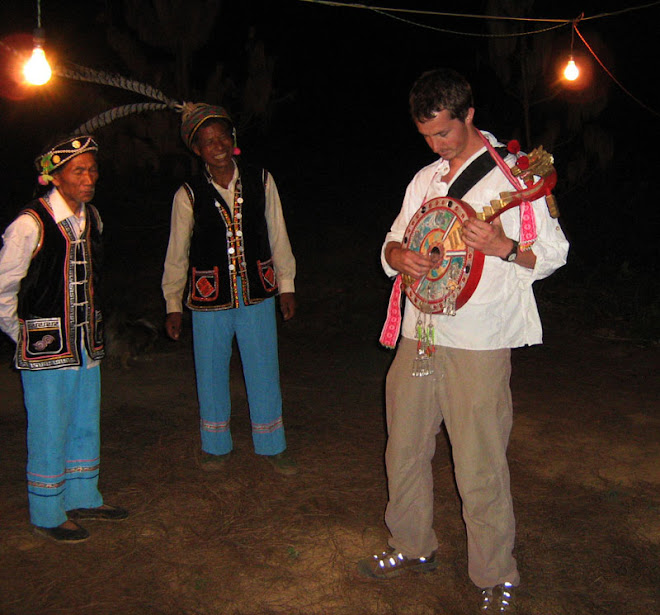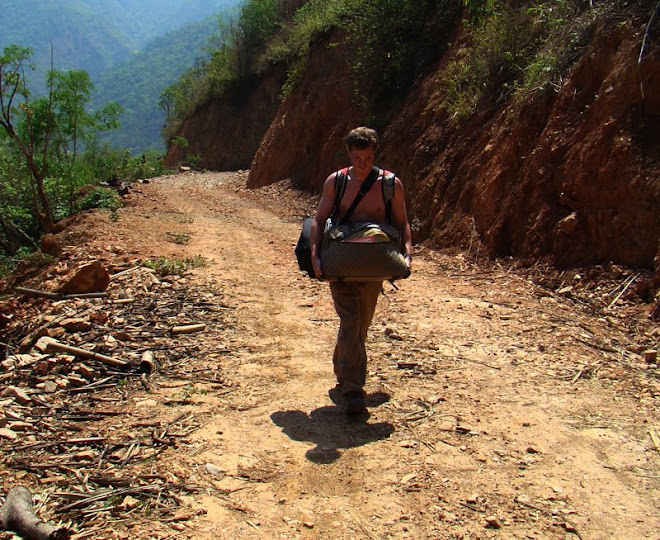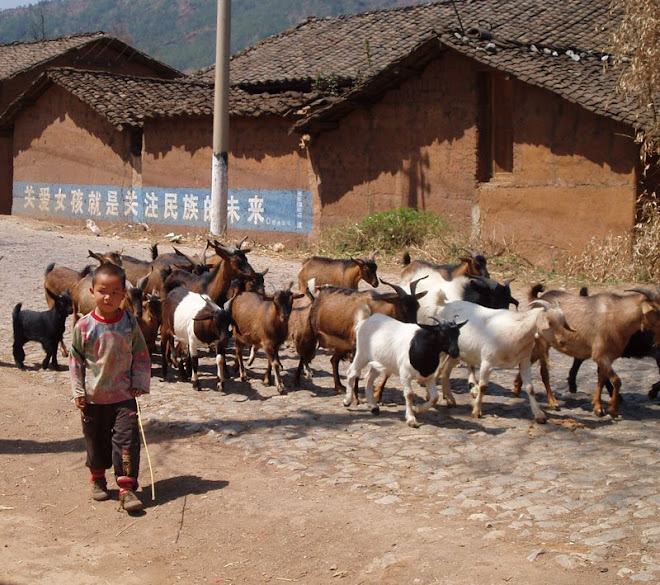If there are actually people anxiously waiting to read my next blog, I apologize for the long wait....you can finally rest easy. Hmmm, where exactly should I start. I'm currently in Kunming....which is in China (in case you forgot). Ashkon Akesheh (a 1st year med student at UCI), Jessie Guilmette (a recreational therapist/humanitarian worker/golden flower), and I (prospective med student) arrived in Kunming on the 22nd of July. We spent our first night in Dr. Detrano's apartment and early the next morning hopped on a bus for a long 7 hour ride to Dali. Our destination was a county called Eryuan which was just northwest of Dali. Bob (the doc) had never been to Eryuan before and was interested in it as a future location for conducting research. We spent three days in Eryuan running hypertension clinics for roughly 7 hours a day. The local doctors would gain general information from each patient like age, past medical history, chief complaint (etc.) and then Jessie and I would take blood pressure measurements and calculate BMI's (body mass index). After acquiring this necessary information Bob and Ashkon would run through a full physical check up. This generally consisted of (depending on the complaint) palpating around the neck, back, and abdomen, then listening to the lungs and heart. Because we were being advertised as a hypertension clinic, you can imagine the number of people we saw with high blood pressure. I actually measured somebody as high as 276/115 and surprisingly this woman was in relatively good shape. Even after being advised by Bob to go to the local hospital she adamantly refused, took her free dosage of beta-blocker and walked home. Most of our patients were older women ranging from 70-90 years of age. We were only in Eryuan for 3 days so we had a lot of patients eagerly waiting to see us. The tension in the waiting room was clearly visible. Jessie and I on a number of occasions watched an old woman try to cheat her way in front of the line. One woman was ostracized from the group after she unsuccessfully tried to place her medical information on top of an already organized pile. We didn't know quite what they were saying to each other, but we could tell by the tone of their voices that they weren't exactly exchanging pleasantries. We're in Kunming just for one night and then we're off to Wenshan (southeast Yunnan) to do research for around 10 days. I don't know what the internet situation will be like but I'll try to write as soon as I have a chance. Enjoy the pictures and stories and I hope everyone is well.
Wednesday, August 6, 2008
July 2008, my return
Monday, July 14, 2008
Heading back to Yunnan

Hello blog readers! If you’ve seen the blog or spoken to me within the past 4 months you’re probably aware of my experiences in China. The 5 weeks I spent from late March to early May were truly amazing and I’m happy to announce that I’ll be continuing this journey starting July 20th for roughly 4 weeks. I’m also excited that on this next China excursion I will not be the only student to be volunteering with the China-California Heart Watch. Along with Dr. Detrano and me, three other students will be joining us. Finally I won’t be the only one lost in translation.
We will be carrying on hypertension research and educating village doctors in even more remote locations within Yunnan Province. Our focus will be on villages located in North West Yunnan, some bordering Tibet. Some of the highlights of my first trip can be read on earlier blogs that were submitted, but if you’re looking for a quick, abbreviated version, let me fill you in.
Arriving in Kunming on March 26th, we immediately caught a bus north to Hui Ze County and stayed for 10 days in a township called Yi Che. From Yi Che we traveled to villages in the surrounding area gathering medical data and running cardiology clinics. We saw a very wide variety of cardiac diseases. Because our focus is hypertension, we were always keen on handing out medication and advising patients to practice preventive care. This would usually include telling patients to cut down on their salt intake, and especially to quit smoking.
We also traveled to a village south of Kunming called Ge Bai Kong. This location was unusually scenic as it was located on the side of a mountain with a river slicing through the valley below. Other mountainside villages could be seen in the distance, separated by miles of nearly impassable terrain. Every location we traveled to we were welcomed with open arms and treated like family. Those we treated were so grateful.

It was as if they had been neglected their entire lives and finally someone had come to help.
Needless to say, I’m overjoyed with the opportunity to return to China and help the China California Heart Watch. Being able to practice medicine, make humanitarian contributions, and experience a culturally rich and beautiful country has been the most fruitful experience of my life…..and I get to do it all again.
About Chinacal Internship

For those of you who are unfamiliar with exactly what we're doing, let me give you a quick overview. Dr. Detrano is the president of an organization that he started called the China-California Heart Watch. He's currently conducting research in the Yunnan Province (poorest province in China) to study the effects of High Blood Pressure in rural villages and townships. Because of the lack of knowledge about hypertension and subsequently the inaccessibility of proper care, Dr. Detrano believes that incidences of cardiovascular disease (CVD) will increase tremendously over the course of the next 30 to 40 years. Currently 70% of the Chinese population live in rural farming communities, however, by 2040 it has been estimated that this number will decrease to about 30% as the population becomes more urbanized due to job opportunities that become available only by living in the city. The unhealthy lifestyle that is naturally adopted through city living will only add to the already frighteningly high predicted rates of heart disease. Through research and education, Dr. Detrano helps to raise awareness and potentially prevent what could possibly become an epidemic of CVD in China.


Monday, April 28, 2008
Hypertension Conference in Kunming

After our wonderful experience in "Go Back Home" we traveled back to Kunming where we've been ever since. We haven't had much down time though because Bob, almost immediatley upon arriving home, had to start preparing for a conference that he originally planned and hosted on the 26th and 27th of April. The purpose of the conference was to invite village doctors from around Yunnan and surrounding provinces to participate in a two day educational experience focusing on diagnosing and treating hypertension. Some of Bob's colleagues and friends from the United States even showed up like Dr. Nathan Wong, Dr. Jen Chen Yang, and the always effervescent Joy Beckmann. All three, including Bob, gave presentations. There were also many other doctors, some educated in the U.S. and now working in China and others from China, that participated in the hypertension conference. Bob even had a special guest Dr. Hu Da Yi, give a speech. Dr. Hu is apparently the number one cardiologist in all of China. This was the first time that a conference had been organized to specifically educate the village doctors and as Bob puts its, "It was a historical moment" made even more special by the fact that such a prominent figure such as Dr. Hu Da Yi was there to show his support. It was a great success, made so by a combined effort from all those who taught and attended....especially me. I had the demanding responsibility of notifying those who were speaking to how much time they had left. Actually, this responsibility was shared between myself, Shao Li, and Shao Kong. Nevertheless, the success of the conference balanced directly on our ability to visibly display how much time each speaker had remaining. Had the speakers exceeded their time limit, could have been a total disaster.
I hope everyone is picking up on my sarcasm.
I hope everyone is picking up on my sarcasm.
Wrapping up the journey...Gratitude and Significance of Chinacal.org
Well I think that pretty much wraps it up. I can't express enough gratitude to those who helped me partake in such a unbelievable and memorable experience. The China California Heart Watch is an amazing organization that, amongst its humanitarian efforts (ie. running free clinics, providing medication, and offering grants for sick children), also strives to educate village doctors about the importance of treating hypertension. I encourage all those who are interested to check out the website www.chinacal.org
Last Day in Kunming
Today is officially my last full day in Kunming for tomorrow I fly to Shanghi, overnight, and then back to the states on the 30th. Departing China will be bittersweet because as much as I want to see friends and family back in the good ol' US of A, I have had a wonderful experience in China and have met people and seen places that has left a lasting impression. However, I cannot be too upset because I do plan on coming back in July and continuing my work and research with Bob and the China-California Heart Watch. Anyways, enough with the sentimental talk, lets cut to the chase.....what has been going on for the past two weeks? Simply put, a lot.
Please scroll down to see more recent photos of the conference and our wrap up days in Kunming, and to read more about the conference...
Our stay in 'Sure Ping",not quite a sure thing!
Around April 10th the doc, Shan Shan, Shao Li, and I traveled to another township, and from there, to another village. Because I can never remember the actual spelling of these locations, I'm going to have to write how they sounded phonetically. We traveled south of Kunming for about three and a half hours by bus before arriving at "Sure Ping", the main township of the county. From "Sure Ping" we hopped in a car and drove another 30min or so before arriving at another township called "Bow Shoe". It was in "Bow Shoe" that we spent our first night. Bob, who had been to "Bow Shoe" before, had forewarned me that our living accomodations weren't going to be exactly, hmmm how would I put it?....nice. It wasn't that the hotel didn't provide the essentials like beds, sheets, or a bathroom, rather that the place had a cockroach infestation, was swarming with mosquitos, and smelled like a sewage treatment plant. I was actually brazen enough to use the shower the next morning and was unable to distinguish whether that awful stench was coming from the shower head or the toilet, I like to believe it was the latter. Fortunately we were only there for one night. The next morning we packed up, hopped in a truck, and headed towards the village which was amusingly pronounced, but incorrectly spelled, "Go Back Home". This village was far and away the most beautiful and scenic location we had been to while in China. It was built on the side of a mountain, existing amidst a number of other mountains, which overlooked a river that ran a serpentine course through the valley below. Ironically, the environment surrounding the village was closely similar to what I'm familiar with "back home" in Ketchum, Idaho. However, before enjoying this majestic setting, we had to endure some serious hardship. Our driver, who we had paid handsomely to drive us to our location, refused to cross the river at the base of the mountain where the village was located. He was worried that the foot and a half of water that we would have to forge could possibly get the engine wet which would prevent the car from running. So rather he be stuck, he took our money and kicked us out at the edge of the river with all our luggage. I guess the concept of a refund doesn't exist in China. So as Bob in an annoyingly, and suspiciously chipper tone put it, "ha ha, well, i guess we're walking". So we hiked with Shao Li and myself shouldering most of the weight. This was, as you might have already imagined, not a pleasant experience. The first hour or so was not particularly bad. It was once we reached what we thought had been the top, realizing that it was not, and being asked to carry more weight, that my temperament really started to turn sour. I had to akwardly cradle Shan Shan's suitcase like an overweight baby, and even though I adore Shan Shan, at one point I felt like shot putting her bag halfway down the mountain side. It was also a hot day. More than two weeks later and skin is still peeling off my shoulders and back. Finally, when Bob had had enough, he sent Shao Li on a solo mission to reach the top and retrieve transportation. It didn't take Shao Li long because little did we know, we were only about a quarter of a mile from the village.
So we made it to the top, got settled into the village doctor's home, had lunch and began with a free clinic. If you've seen the photos you can probably tell that we're still recovering from the hike, looking tired and sweaty. We ended up spending a total of four days and three nights in "Go Back Home". We continued our research in the village and near the village center which was about a 20min hike from where we were staying. On our last night there we were treated with a very special surprise. All of the villagers were part of the Yi minority. The Yi people are 1 of 55 ethnic minorities that are officially recognized in the People's Republic of China. To save time describing every aspect of their culture I'm attaching this link for interested readers: http://en.wikipedia.org/wiki/Yi_people. Needless to say, they are a fascinating group of people with long traditional roots. Bob had asked some of the villagers to dress up in their traditional garb and show us some of their dances. They agreed but asked us to give them a day or so to get prepared. What we expected was a private showing with maybe a couple of the locals. What we received was a full blown village performance. We were taken to a spot that was perched on the side of the mountain where a large, flat area of ground had been cleared off specifically for festive occasions. It was on this make-shift dance floor where 30 to 40 of the older generation villagers got dressed up, grabbed their instruments, and put on about an hour and a half long performance for us. Definetly the highlight of my trip. What I hadn't known though was that Bob had told the villagers that because they showed us their dance moves, that in return, I personally would give them a demonstration of how a Westerner dances. I wasn't given any prior notice, the music they were playing was far from what I was accostomed to, and in addition, he expected me to dance by myself in front of the entire village. No Way! What I was able to do was convince Shan Shan to come out on the dance floor with me and give them a demonstration of a simple two-step. Ultimately, I was able to save face (very important in China) and not disappoint the locals.
So we made it to the top, got settled into the village doctor's home, had lunch and began with a free clinic. If you've seen the photos you can probably tell that we're still recovering from the hike, looking tired and sweaty. We ended up spending a total of four days and three nights in "Go Back Home". We continued our research in the village and near the village center which was about a 20min hike from where we were staying. On our last night there we were treated with a very special surprise. All of the villagers were part of the Yi minority. The Yi people are 1 of 55 ethnic minorities that are officially recognized in the People's Republic of China. To save time describing every aspect of their culture I'm attaching this link for interested readers: http://en.wikipedia.org/wiki/Yi_people. Needless to say, they are a fascinating group of people with long traditional roots. Bob had asked some of the villagers to dress up in their traditional garb and show us some of their dances. They agreed but asked us to give them a day or so to get prepared. What we expected was a private showing with maybe a couple of the locals. What we received was a full blown village performance. We were taken to a spot that was perched on the side of the mountain where a large, flat area of ground had been cleared off specifically for festive occasions. It was on this make-shift dance floor where 30 to 40 of the older generation villagers got dressed up, grabbed their instruments, and put on about an hour and a half long performance for us. Definetly the highlight of my trip. What I hadn't known though was that Bob had told the villagers that because they showed us their dance moves, that in return, I personally would give them a demonstration of how a Westerner dances. I wasn't given any prior notice, the music they were playing was far from what I was accostomed to, and in addition, he expected me to dance by myself in front of the entire village. No Way! What I was able to do was convince Shan Shan to come out on the dance floor with me and give them a demonstration of a simple two-step. Ultimately, I was able to save face (very important in China) and not disappoint the locals.
see pictures below....
Monday, April 21, 2008
Sunday, April 20, 2008
New Pictures April 19, 2008
Tuesday, April 15, 2008
Update with funny stories
Well it's about that time again, sending those interested readers another update on my China experiences. It's hard to know where to start considering everday is a new adventure filled with bizarre sites and odd encounters. China is a strange an intriguing country and as Dr. Detrano has put it, "A place of contrast and contradiction". A land which is becoming increasingly more important on a global scale, where thousands of years of culture and tradition akwardly and amusingly try to coexist and integrate into a new generation being created by the fastest growing economy in the world. A place where communism and capitalism walk hand in hand. Where urbanization is an interminable process and rural living is and will eventually become depleted. As a couple foreigners who have been living in China have told me, "You can't find a more interesting place in the world to be visiting, especially with the upcoming olympics, which direction the country goes in the next decade or so is really anyone's guess". I encourage anyone with the opportunity to travel to come check out China, you will not be disappointed.
So, for the past 5 days or so I've been in Kunming. I went byyyee-cycling with Bob, checked out dragon gate temple in the West Mountains with Shao Li, and celebrated one of Shao Li's friends birthday by eating pig leg for dinner and drinking beers at a karaoke bar. Dragon gate temple was beautiful, the bicycling was death-defying, the pig leg was delicious, and the karaoke singing was humiliating. Maybe it's the way the Chinese language sounds but everyone who sang karaoke had fantastic voices and nailed every song with perfect precision, I on the other hand completely accosted everyones eardrums with terrible renditions of Michael Jackson's "Beat It" and the theme song to ghostbusters. Adorably however, the chinese will never let you think that you butchered the song by always adding a thunderous applause at the end. Unlike many of my friends, they never have something criticizing to say, probably because they don't know how to say it, but regardless, I'm considering making a trade. Dr. Detrano left on Saturday to go conduct some business in a nearby city, so for the past couple days I've been hanging out with Shan Shan and Shao Li. Because neither of them speak english very well, especially Shao Li, you can only imagine the communication problems we've encountered and assume that we have not been engaging in the most interesting of conversations. There is not much talk of politics, religious beliefs, or even an account of an amusing anecdote. With Shao Li, we have accomplished the impossible if were even able to successfully exchange a proper greeting. Needless to say, this is not exactly the type of person you want parading you around the city and acting as your translator. For a while, due to the language barrier, we actually had a very funny misunderstanding for a while. For our entire stay in Yi Che, Shao Li and I were roomates. Through out the entire trip we were helping each other learn our respective languages. I'd point to an object in the room and say it an english, then he would tell me in Chinese. One day we were sitting in our hotel room and I pointed to the bathroom, which happened to be next to the door that left our room, and said "bathroom". Because he had trouble with the pronunciation of the words Shao Li was also writing down, in chinese characters, the correct pronunciation on a sheet of paper (kind of like pinyin for english speakers trying to learn chinese). Well for the next couple of days Shao Li kept asking me if I wanted to use the bathroom. He would either say, "do you want to go to the bathroom?" (not even that well though), or he would simply ask me in an inquisitive manner, "bathroom?". I found this very strange. I thought to myself, does he want me to go to the bathroom with him? is he being polite and asking if i want to use the bathroom before he does? or is he treating me like I'm 5 and making sure that I use the bathroom before we go out somewhere? I really had no idea. It wasn't until much later, when Bob, Shan Shan, Shao Li, and myself were all hanging out that the truth was discovered. Bob and Shan Shan were hysterically laughing as Shao Li was showing them his piece of paper with character written versions of english pronunciation. They found one in particular very funny. The day I was teaching Shao Li how to say bathroom, he had misunderstood and thought I was pointing to the door, implying that "bathroom" was synonymous with "leaving the room" or "going out". So on a number of occasions Shao Li would want to go eat and would say, "Jason, bathroom?" at which I would always reply, "Uh, no thank you Shao Li, I don't have to use the bathroom" at which he would usually just shrug his shoulders and leave the room. I'm happy to report that I'm no longer asked to use the bathroom with Shao Li and that we're able to successfully eat dinner together. This is only one of many experiences that I've had like that.
I'm actually going to have to leave this update a little shorter than the previous one because Bob is just getting back from his trip and probably wants to use his computer. We will be leaving tomorrow morning for another rural excursion to continue our research. I can't remember the name of the township but its about 4 hours south of Kunming and will be comparable to what our conditions were like in Yi Che and its surrounding villages. We'll make sure to snap some good photos and I'll post a message as soon as I get the chance. I hope everyone is doing well and I'll try to write soon.
-Jason
So, for the past 5 days or so I've been in Kunming. I went byyyee-cycling with Bob, checked out dragon gate temple in the West Mountains with Shao Li, and celebrated one of Shao Li's friends birthday by eating pig leg for dinner and drinking beers at a karaoke bar. Dragon gate temple was beautiful, the bicycling was death-defying, the pig leg was delicious, and the karaoke singing was humiliating. Maybe it's the way the Chinese language sounds but everyone who sang karaoke had fantastic voices and nailed every song with perfect precision, I on the other hand completely accosted everyones eardrums with terrible renditions of Michael Jackson's "Beat It" and the theme song to ghostbusters. Adorably however, the chinese will never let you think that you butchered the song by always adding a thunderous applause at the end. Unlike many of my friends, they never have something criticizing to say, probably because they don't know how to say it, but regardless, I'm considering making a trade. Dr. Detrano left on Saturday to go conduct some business in a nearby city, so for the past couple days I've been hanging out with Shan Shan and Shao Li. Because neither of them speak english very well, especially Shao Li, you can only imagine the communication problems we've encountered and assume that we have not been engaging in the most interesting of conversations. There is not much talk of politics, religious beliefs, or even an account of an amusing anecdote. With Shao Li, we have accomplished the impossible if were even able to successfully exchange a proper greeting. Needless to say, this is not exactly the type of person you want parading you around the city and acting as your translator. For a while, due to the language barrier, we actually had a very funny misunderstanding for a while. For our entire stay in Yi Che, Shao Li and I were roomates. Through out the entire trip we were helping each other learn our respective languages. I'd point to an object in the room and say it an english, then he would tell me in Chinese. One day we were sitting in our hotel room and I pointed to the bathroom, which happened to be next to the door that left our room, and said "bathroom". Because he had trouble with the pronunciation of the words Shao Li was also writing down, in chinese characters, the correct pronunciation on a sheet of paper (kind of like pinyin for english speakers trying to learn chinese). Well for the next couple of days Shao Li kept asking me if I wanted to use the bathroom. He would either say, "do you want to go to the bathroom?" (not even that well though), or he would simply ask me in an inquisitive manner, "bathroom?". I found this very strange. I thought to myself, does he want me to go to the bathroom with him? is he being polite and asking if i want to use the bathroom before he does? or is he treating me like I'm 5 and making sure that I use the bathroom before we go out somewhere? I really had no idea. It wasn't until much later, when Bob, Shan Shan, Shao Li, and myself were all hanging out that the truth was discovered. Bob and Shan Shan were hysterically laughing as Shao Li was showing them his piece of paper with character written versions of english pronunciation. They found one in particular very funny. The day I was teaching Shao Li how to say bathroom, he had misunderstood and thought I was pointing to the door, implying that "bathroom" was synonymous with "leaving the room" or "going out". So on a number of occasions Shao Li would want to go eat and would say, "Jason, bathroom?" at which I would always reply, "Uh, no thank you Shao Li, I don't have to use the bathroom" at which he would usually just shrug his shoulders and leave the room. I'm happy to report that I'm no longer asked to use the bathroom with Shao Li and that we're able to successfully eat dinner together. This is only one of many experiences that I've had like that.
I'm actually going to have to leave this update a little shorter than the previous one because Bob is just getting back from his trip and probably wants to use his computer. We will be leaving tomorrow morning for another rural excursion to continue our research. I can't remember the name of the township but its about 4 hours south of Kunming and will be comparable to what our conditions were like in Yi Che and its surrounding villages. We'll make sure to snap some good photos and I'll post a message as soon as I get the chance. I hope everyone is doing well and I'll try to write soon.
-Jason
Tuesday, April 8, 2008
April 8,2008 Back in Kunming
Well after about ten days in the Bush, I'm back in Kunming where I can conveniently control the temperature of my shower and not have to squat when taking a.....Needless to say my experiences in Yi Che and the surrounding villages that we traveled to gave me a unique insight and glimpse into the China that is not popularly traveled to by tourists. While the township of Yi Che still resembles somewhat of a modernized city, the distant villages or what we like to consider as third world. Poor plumbing (if any), little electricity and local villagers who look like they've never seen a toothbrush, a bar of soap, or any utensil for hygenic purposes (which very likely they have not).
One village in particular, Shi Ban, was about fourteen miles from Yi Che but took more than two hours to reach by car. We traveled there on three separate occasions which added up to about 12 hours of the most harrowing and treacherous driving I've ever experienced. The road was bumpy, narrow, and winding and a minor mistake could have caused the car to plummet a looong way down. On one occasion we were taken about half way and then expected to walk, but by chance we caught up with a car that happened to be traveling near our location. The car however was a small truck (small in China is on a whole different scale) and myself, Shao Li, and a doctor from the Yi Che hospital were crammed in the bed for an uncomfortable hour and a half long drive.
Because we had no source of transportation from Shi Ban back to Yi Che, we walked about 7 miles back until we were finally picked up. It would be an understatement to say that I was more than happy to see Shi Ban go. The other village that we traveled to was much more easily accessible and involved maybe a 15 minute drive up a cobblestone road from Yi Che. We ran research and free clinics from this location but mainly focused on research.
One village in particular, Shi Ban, was about fourteen miles from Yi Che but took more than two hours to reach by car. We traveled there on three separate occasions which added up to about 12 hours of the most harrowing and treacherous driving I've ever experienced. The road was bumpy, narrow, and winding and a minor mistake could have caused the car to plummet a looong way down. On one occasion we were taken about half way and then expected to walk, but by chance we caught up with a car that happened to be traveling near our location. The car however was a small truck (small in China is on a whole different scale) and myself, Shao Li, and a doctor from the Yi Che hospital were crammed in the bed for an uncomfortable hour and a half long drive.
Because we had no source of transportation from Shi Ban back to Yi Che, we walked about 7 miles back until we were finally picked up. It would be an understatement to say that I was more than happy to see Shi Ban go. The other village that we traveled to was much more easily accessible and involved maybe a 15 minute drive up a cobblestone road from Yi Che. We ran research and free clinics from this location but mainly focused on research.
For those of you who are unfamiliar with exactly what we're doing, let me give you a quick overview. Dr. Detrano is the president of an organization that he started called the China-California Heart Watch. He's currently conducting research in the Yunnan Province (poorest province in China) to study the effects of High Blood Pressure in rural villages and townships. Because of the lack of knowledge about hypertension and subsequently the inaccessibility of proper care, Dr. Detrano believes that incidences of cardiovascular disease (CVD) will increase tremendously over the course of the next 30 to 40 years. Currently 70% of the Chinese population live in rural faming communities, however, by 2040 it has been estimated that this number will decrease to about 30% as the population becomes more urbanized due to job opportunities that become available only by living in the city. The unhealthy lifestyle that is naturally adopted through city living will only add to the already frighteningly high predicted rates of heart disease. Through research and education, Dr. Detrano helps to raise awareness and potentially prevent what could possibly become an epidemic of CVD in China.
The research involves us traveling to remote and impoverished locations located around the Yunnan Province. Prior to running the research, we randomly select 30 to 40 people born between the years of 1939-1958. Bob has found that anyone younger than this usually is not living in their home village, rather, has left to earn money for his family in a more profitable location such as a city. I haven't found out why he doesn't take research subjects older than 69 although, maybe he suspects that many people do not live much older than around 70 years.
The village doctor usually provides us with the information that we need and works as our liaison between ourselves and the locals. Even though Bob speaks nearly fluent Mandarin, most of the people we see speak a local dialect that can hardly be discerned by Dr. Detrano. Thus, the village doctor usually becomes our translator (most speak Mandarin as well). We take the subjects blood pressure, measure their height and weight, and run through a series of questions such as, do you smoke? drink? how often? etc. It's almost guaranteed that males will answer yes to both questions. I'm yet to meet a Chinese male who is not a habitual chain smoker. Except maybe Shao Li, who is Bob's assistant, and whom has become my good friend over the past couple weeks. If he does smoke, he hides it from Bob, knowing well that our research and education revolves around showing people the consequences of a life long addiction to cigarettes.
After obtaining this general but essential information, we then perform a cardiac sonogram. Much like looking at the sonogram of a pregnant woman, the cardiac sonogram gives us a black, white, and gray image of a planar slice of the heart. We usually place the transducer under the left breast next to the sternum. This window of sight is called the parasternal long axis view. For measurement purposes this view usually provides us with the best picture. However, due to size, weight, diseased lungs, and the fact the women have breasts, sometimes an alternative view must be used to acquire the desired image. We try to obtain a sliced image of the heart where the diameter of the left ventricle appears largest, the thickness of the posterior wall and septal wall appear smallest, and the left atrium and aortic root can be visualized. Bob suggested this thought experiment to me that might help you visualize what we are trying to capture with the cardiac sonogram: Take a cantalope or similar large hollow fruit with an oblong ellipsoid shape. Imagine that you want to make a transecting cut through the cantaloupe in such a way as to best measure the thickness of its walls (rind) at the place where the cantaloupe's minor axis is the longest. You can only make one transecting cut of the entire cantaloupe. How would you do it? Considering that you might not be perfectly accurate with your knife, what are the pitfalls and advantages of cutting the cantaloupe in different ways? As you might have already figured, if you incorrectly cut the cantaloupe (not in the desired location) your rind will appear thicker and the diameter of the empty center will appear smaller. Because our research involves studying the effects of hypertension, and one of those effects is Left Ventricular Hypertrophy (extra growth of the walls of the left ventricle), it is extremely important that we be accurate with our sliced image and obtain measurements that are indeed indicative of LVH and that does not falsely appear as so because of an incorrect slice with the transducer.
I realize this might all sound confusing, but take the time to try and conceptualize whats going on, it's much more simple than you think. Anyway, this is basically how our research is run. Ideally the research subjects show up, we ask them some questions, and then we take measurements of their heart (specifically the left ventricle). When we've seen enough subjects for the day Bob usually runs a free clinic and sees patients (many of whom we've used for research) and tries to treat whatever ails them. Because our resources are limited, there is only so much we can do.
It is particularly distressing to see parents who bring in their young children. Most of them have been born with some sort of congenital heart defect. Dr. Detrano used to be able to provide grants to these otherwise fatally sick children, but due to a limited and fleeting budget, he is no longer able to provide this service. I plan on helping Bob's foundation by doing some fundraising when back in Sun Valley. If anyone is interested in making a donation you can either go the website www.chinacal.org or write a check made out to the China California Heart Watch and send it to:
The village doctor usually provides us with the information that we need and works as our liaison between ourselves and the locals. Even though Bob speaks nearly fluent Mandarin, most of the people we see speak a local dialect that can hardly be discerned by Dr. Detrano. Thus, the village doctor usually becomes our translator (most speak Mandarin as well). We take the subjects blood pressure, measure their height and weight, and run through a series of questions such as, do you smoke? drink? how often? etc. It's almost guaranteed that males will answer yes to both questions. I'm yet to meet a Chinese male who is not a habitual chain smoker. Except maybe Shao Li, who is Bob's assistant, and whom has become my good friend over the past couple weeks. If he does smoke, he hides it from Bob, knowing well that our research and education revolves around showing people the consequences of a life long addiction to cigarettes.
After obtaining this general but essential information, we then perform a cardiac sonogram. Much like looking at the sonogram of a pregnant woman, the cardiac sonogram gives us a black, white, and gray image of a planar slice of the heart. We usually place the transducer under the left breast next to the sternum. This window of sight is called the parasternal long axis view. For measurement purposes this view usually provides us with the best picture. However, due to size, weight, diseased lungs, and the fact the women have breasts, sometimes an alternative view must be used to acquire the desired image. We try to obtain a sliced image of the heart where the diameter of the left ventricle appears largest, the thickness of the posterior wall and septal wall appear smallest, and the left atrium and aortic root can be visualized. Bob suggested this thought experiment to me that might help you visualize what we are trying to capture with the cardiac sonogram: Take a cantalope or similar large hollow fruit with an oblong ellipsoid shape. Imagine that you want to make a transecting cut through the cantaloupe in such a way as to best measure the thickness of its walls (rind) at the place where the cantaloupe's minor axis is the longest. You can only make one transecting cut of the entire cantaloupe. How would you do it? Considering that you might not be perfectly accurate with your knife, what are the pitfalls and advantages of cutting the cantaloupe in different ways? As you might have already figured, if you incorrectly cut the cantaloupe (not in the desired location) your rind will appear thicker and the diameter of the empty center will appear smaller. Because our research involves studying the effects of hypertension, and one of those effects is Left Ventricular Hypertrophy (extra growth of the walls of the left ventricle), it is extremely important that we be accurate with our sliced image and obtain measurements that are indeed indicative of LVH and that does not falsely appear as so because of an incorrect slice with the transducer.
I realize this might all sound confusing, but take the time to try and conceptualize whats going on, it's much more simple than you think. Anyway, this is basically how our research is run. Ideally the research subjects show up, we ask them some questions, and then we take measurements of their heart (specifically the left ventricle). When we've seen enough subjects for the day Bob usually runs a free clinic and sees patients (many of whom we've used for research) and tries to treat whatever ails them. Because our resources are limited, there is only so much we can do.
It is particularly distressing to see parents who bring in their young children. Most of them have been born with some sort of congenital heart defect. Dr. Detrano used to be able to provide grants to these otherwise fatally sick children, but due to a limited and fleeting budget, he is no longer able to provide this service. I plan on helping Bob's foundation by doing some fundraising when back in Sun Valley. If anyone is interested in making a donation you can either go the website www.chinacal.org or write a check made out to the China California Heart Watch and send it to:
1150 Capitol Drive, Unit 119
San Pedro, California, 90732
That is all for now and I'll write again when I have the opportunity. I'm about to go bye-cycling around Kunming, (Bob has a weird way of pronouncing that word!)
Jason
Jason
Wednesday, April 2, 2008
UPDATE
Jason and Dr. Detrano have been very busy seeing patients. They did manage to send some new photos, page down to view the new photos. As soon as we get an update, we will post Jason's news!
Sunday, March 30, 2008
Day 2





I am using the internet in an internet bar right now in Yi Che. During our research today we took some great pictures so hopefully Bob will get those sent to you guys. I think its kind of tricky sending lots of photos as attachments without slowing up the connection around here, hopefully though some will come through and you'll get an idea of what we've been doing. I'm about to go to bed, i'm completely exhausted, but i'll keep writing when ever i have the opportunity.
Day 1 At Work
We're currently in the county of Hui Ze and staying in the village of Yi Che. From here were going to travel to some more distant townships. Today Bob ran a free clinic out of the local hospital. People came in with all sorts of complaints and Bob ran through a general physical check up. Occasionaly he would break out the sonogram machine and check for any cardiac abnormalities. It was also market day today. Once every six or seven days people from surrounding townships come down to the village to sell their products. It was crazy. Most of the people here have never seen a white foreigner, so you can only imagine the amount of surprised looks us white folks received. Bob's assistant Shan Shan Chen took some amazing photos. Yi Che will be home for the next two weeks but will be doing daily excursions to more remote locations. I've never experienced something quite like this and probably won't again, unless I decide to come back (hint hint).
(i tried to write this as my blog but i'm having trouble accessing the website, the internet connection is not great where I am)
Subscribe to:
Comments (Atom)

















